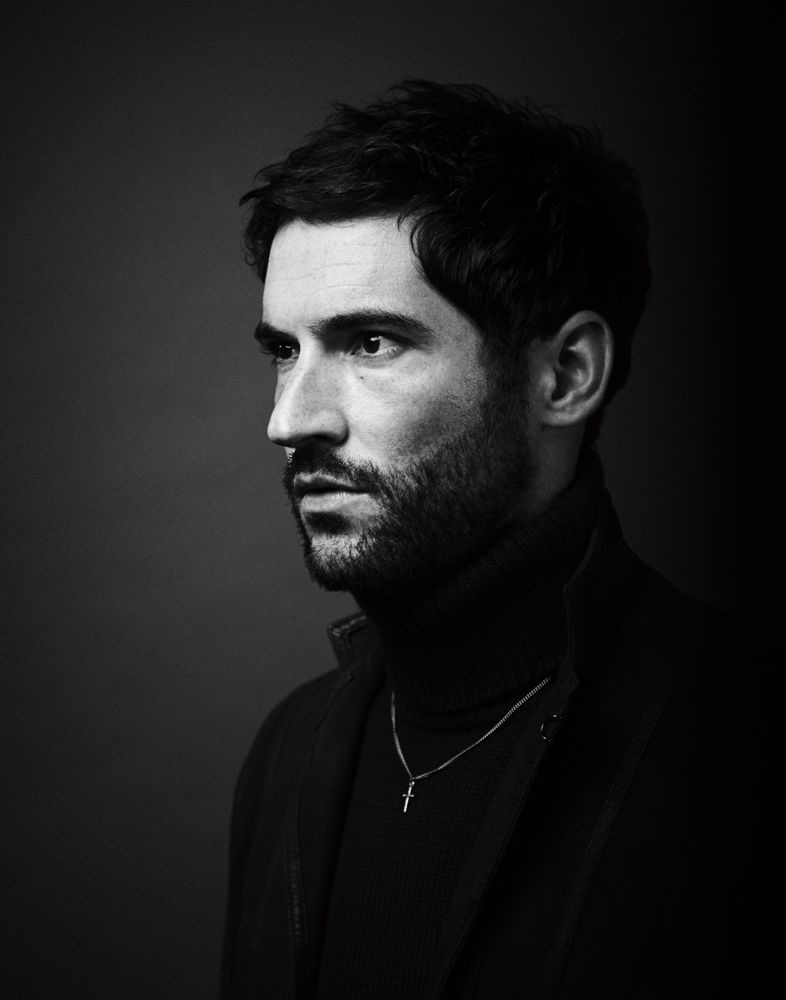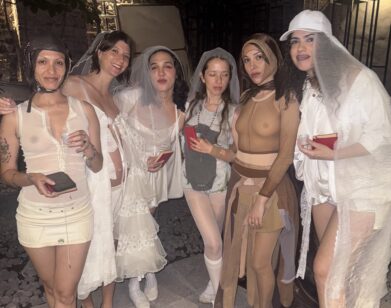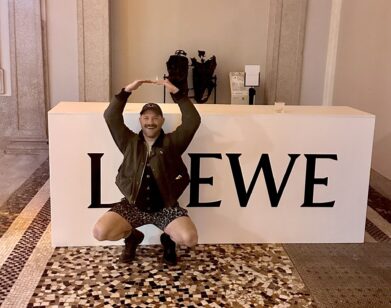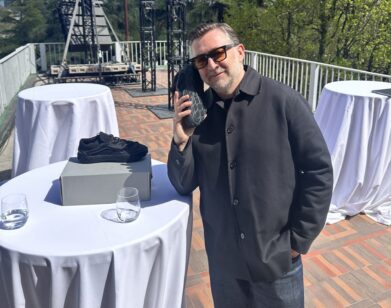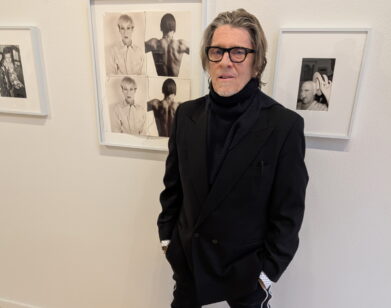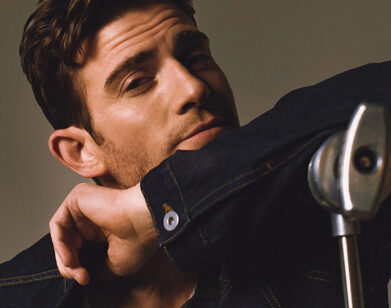The Devil in Tom Ellis
TOM ELLIS IN LONDON, AUGUST 2015. PHOTOS: MATT HOLYOAK/KAYTE ELLIS AGENCY. STYLING: NIC JOTTKANDT. GROOMING: LARRY KING FOR STREETERS. PHOTO ASSISTANTS: JACK DONCASTER AND SAM WILSON.
In Lucifer, Fox’s 2016 dramedy based on the graphic novels by Neil Gaiman, the Devil is more mischievous than cruel. He looks a bit like James Bond—or perhaps a villain out of Jaguar’s “it’s good to be bad” commercial—and has the morals of a debauched investment banker (albeit with a little more heart). “I suppose he’s kind of a caddish figure,” says Tom Ellis, who stars as Lucifer Morningstar. “For me, it was apparent that he was from somewhere else compared to the rest of the characters. He read like something out of a high-style theater play by Oscar Wilde or Noel Coward,” he continues. “That give me the backbone of what I was doing, infused with a bit of rock ‘n’ roll and Mick Jagger. You’ve got this kind of flamboyant character at the end of it.”
Now in his mid-30s, Ellis grew up in the U.K. and went to drama school at the Royal Scottish Academy in Glasgow with James McAvoy, Sam Heughan, and Laura Donnelly, among others. He’s spent much of his 15-year career on television; last year he starred as another suave bad-boy on U.S.A.’s Rush, and, for the last five years, he’s played Gary Preston in the cult British comedy Miranda.
We recently spoke with Ellis via the phone.
EMMA BROWN: Can you tell me a little bit about how you got involved in Lucifer?
TOM ELLIS: It was one of the few scripts that I read during pilot season this year that, as soon as I read it, I said, “That’s what I want to do.” It was much funnier than anything that I had read. I met Len Wiseman, who had come on board as the director. It was instantaneous for me from that moment. He made it quite apparent that he wanted me to do it, and I really wanted to do the project, so it was just about getting the studio and everyone on board. That came quite quickly as well.
Pilot season’s such a strange time. You get such a concentrated amount of scripts. A lot of them become white noise after a while. When something really pops, it becomes apparent very quickly. I’m quite instinctive about that. I know, normally by about 10 pages in, whether I want to do something or not.
BROWN: What was your first pilot season?
ELLIS: It was back in 2008. I did a pilot for Fox. The more you do, the more you learn about what you want to get out the experience. There’s a lot of people that go there just to get a job and that’s not my motivation any more. I want to be doing the right job.
BROWN: When did you have that realization—that you wanted to do the right job?
ELLIS: I’ve been acting for 15 years now, and the more you do, the more confidence you get about “this is my career and this is what I’m going to be doing.” Since I’ve started coming to the States, I’ve had a really great response. It’s given me a lot of confidence to be more judicious about my own choices. I imagine that’s probably happened in the last few years. I’ve sort of grown into a man myself.
BROWN: Do you come from an artistic family? Was being an actor a feasible goal for you?
ELLIS: My mum was a music teacher. I’ve got three sisters and we all played instruments when we were kids.
BROWN: What did you play?
ELLIS: I started on the trumpet and then I upgraded to the French horn. I played in orchestras my entire teenage years. But, on the drama front, no, not really. My dad, strangely enough for this job, was a Baptist pastor, so I grew up in the church as well. I suppose there is a dramatic element to his job, and he enjoyed doing amateur operatics.
BROWN: Were you in a nativity play?
ELLIS: I was in a nativity play, but being a son of the pastor, I was never allowed to play Joseph or any of the big parts for political reasons.
BROWN: What does you family think of this show?
ELLIS: They haven’t seen it yet; they’ve seen the trailer. They’re all thrilled that I’m doing it. It’s already thrown up a bit of debate, this show. I think the people that take the show in the spirit it’s meant to be received will get the most out of it. Anyone that’s predicting it’s going to be something before even seeing it is a bit foolish, in my view. The show certainly is not a big theological debate. More than anything, I’d say this show is a story of redemption. Obviously one of our main source materials was the graphic novel that it was based on.
BROWN: Were you familiar with the graphic novel beforehand?
ELLIS: I wasn’t at all actually. I have to embarrassingly admit, I didn’t know that it was based on a graphic novel until after I got the job and I read it on Deadline. I’m kind of glad I didn’t, because it didn’t affect my choices at first.
BROWN: When you told your parents you wanted to be an actor, what was their reaction?
ELLIS: It was quite late. It wasn’t like I told them this when I was 12 and blindly put the rest of my education to one side; it was something that I sort of stumbled across in my later school years. They were informed by my drama teacher, who I’m still friends with actually. There was a parents’ evening and they came in and met her, and she was like, “You should think about letting Tom go to drama school.” It was the first time that someone had really done that. So they were quietly supportive; they were never starry parents, going, “Our kid’s going to be such-and-such.” They just let me get on with it, and I appreciated that because it’s given me a good sort of work ethic. I don’t feel entitled to anything.
BROWN: What made you choose to go to drama school at the Royal Scottish Academy?
ELLIS: I was limited in my options. I couldn’t really afford to be a student in London. I had a friend up at Glasgow University and I went up to visit him and just fell in love with the city. I thought it was amazing.
BROWN: Was your program mostly theater based?
ELLIS: Yes, almost completely. The weird thing about drama school is that you train for three years for one thing and then more often than not, it’s something that you haven’t trained for that you end up doing.
BROWN: What was your first job?
ELLIS: My first professional job was while I was still at drama school. My best friend in my year was James McAvoy, and James and I were given a term off to go and do a pantomime in Scotland, which was part of our curriculum at the time. We needed to do a pantomime at the school, or if we booked a professional gig, you’re allowed to go and do it. So we went to a place called Kirkcaldy and did Beauty and the Beast. I was the Beast and the Prince.
BROWN: Who was James?
ELLIS: In pantomime there’s sort of these token characters in each script. He was the young, silly character—sort of like Buttons in Cinderella. [laughs]
BROWN: It’s nice that you were allowed to go off and do professional gigs. I feel like a lot of drama schools don’t want you to do anything professional until you graduate.
ELLIS: I think we were very fortunate with our principal at the time. He was very forward-thinking. He understood that the main objective was to get your students out working in the industry. I ended up leaving a term early because I got another job. It was quite a fluid transition into working, which was more than I hoped for. When you’re a drama student, I think the most you hope for is to make a living out of acting.
BROWN: Were they quite encouraging at school? I spoke to Sam Heughan, who also went to RSA, and he said that one of his professors told him he couldn’t act.
ELLIS: I knew Sam at drama school a little bit. I’ve had these sort of chats with him before. My experience wasn’t that. I felt very encouraged, certainly by a few key members of staff there. But I also had people whose confidence was completely shattered and taken. It’s a very vulnerable time in your life when you go to do something life that. There’s a lot of fragile confidence there. I know Sam had a different experience than I did, but ultimately I was really happy with my three years there.
BROWN: One of your first films was Buffalo Soldiers with Joaquin Phoenix, Anna Paquin, and Ed Harris. You must have been 22. What was that like?
ELLIS: It was a very chastening experience. I went out to Germany to do it. It was a small part in a big movie, but I was there for six weeks. It was great to be a part of it and work with Joaquin, who was really lovely and very welcoming to the rest of his cast. We hung out a bit. Then when I watched the movie my three or four lines in it had been dubbed by another actor. I was like, “Oh. That’s interesting. Okay.” They weren’t very confident in my American accent, which I wasn’t either. It was a learning curve.
BROWN: Did they tell you ahead of time?
ELLIS: I remember on the set, the director was struggling a little bit with my accent, and I lost my confidence a bit. Then I went to watch it uninformed: “I’ve got a different voice…”
BROWN: You’re like Phoebe in Friends when she was dubbed over for the “Smelly Cat” video.
ELLIS: Exactly. It’s my “Smelly Cat” experience.
LUCIFER WILL AIR ON FOX IN 2016. FOR MORE INFORMATION, VISIT THE FOX WEBSITE.

